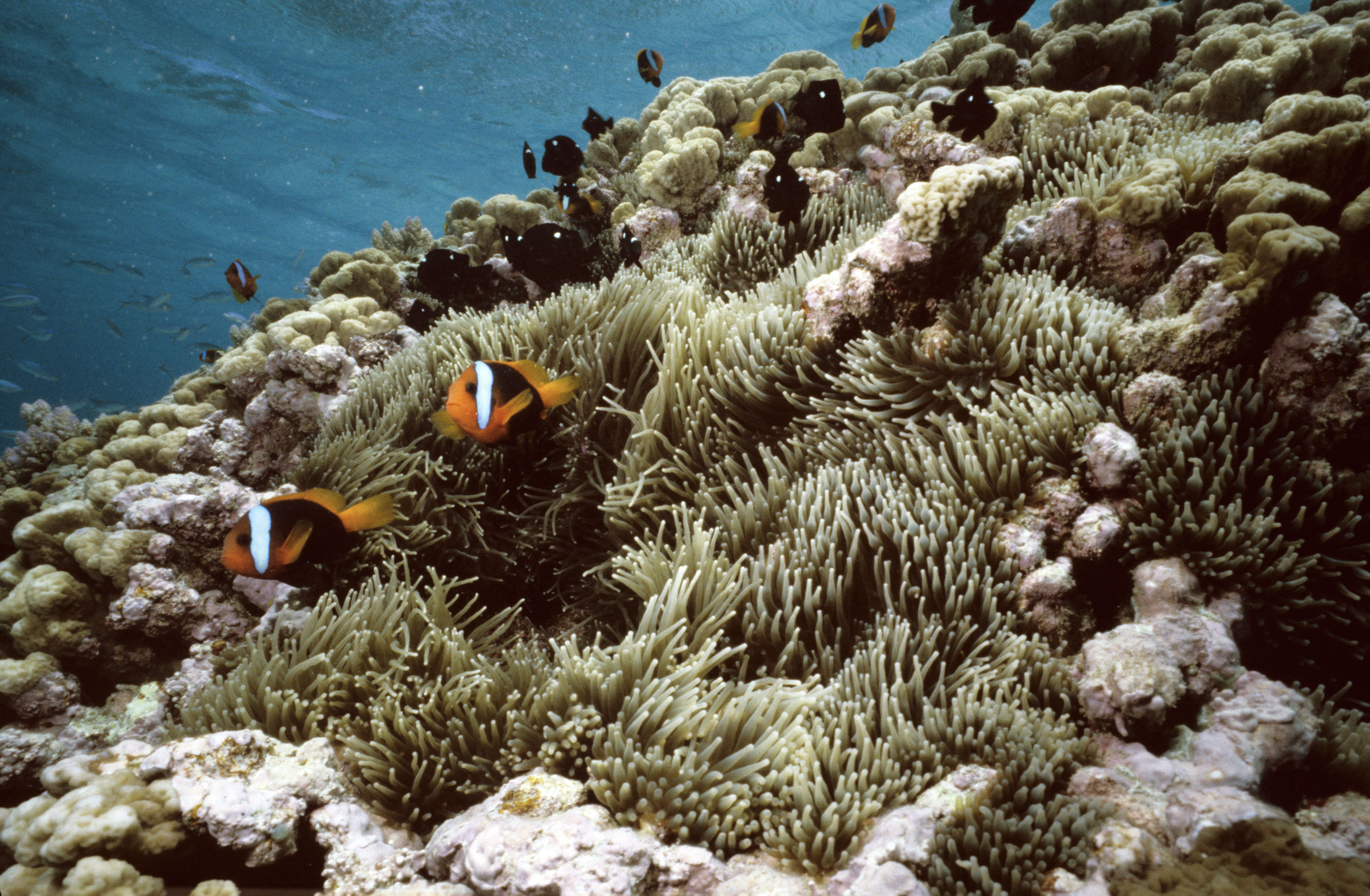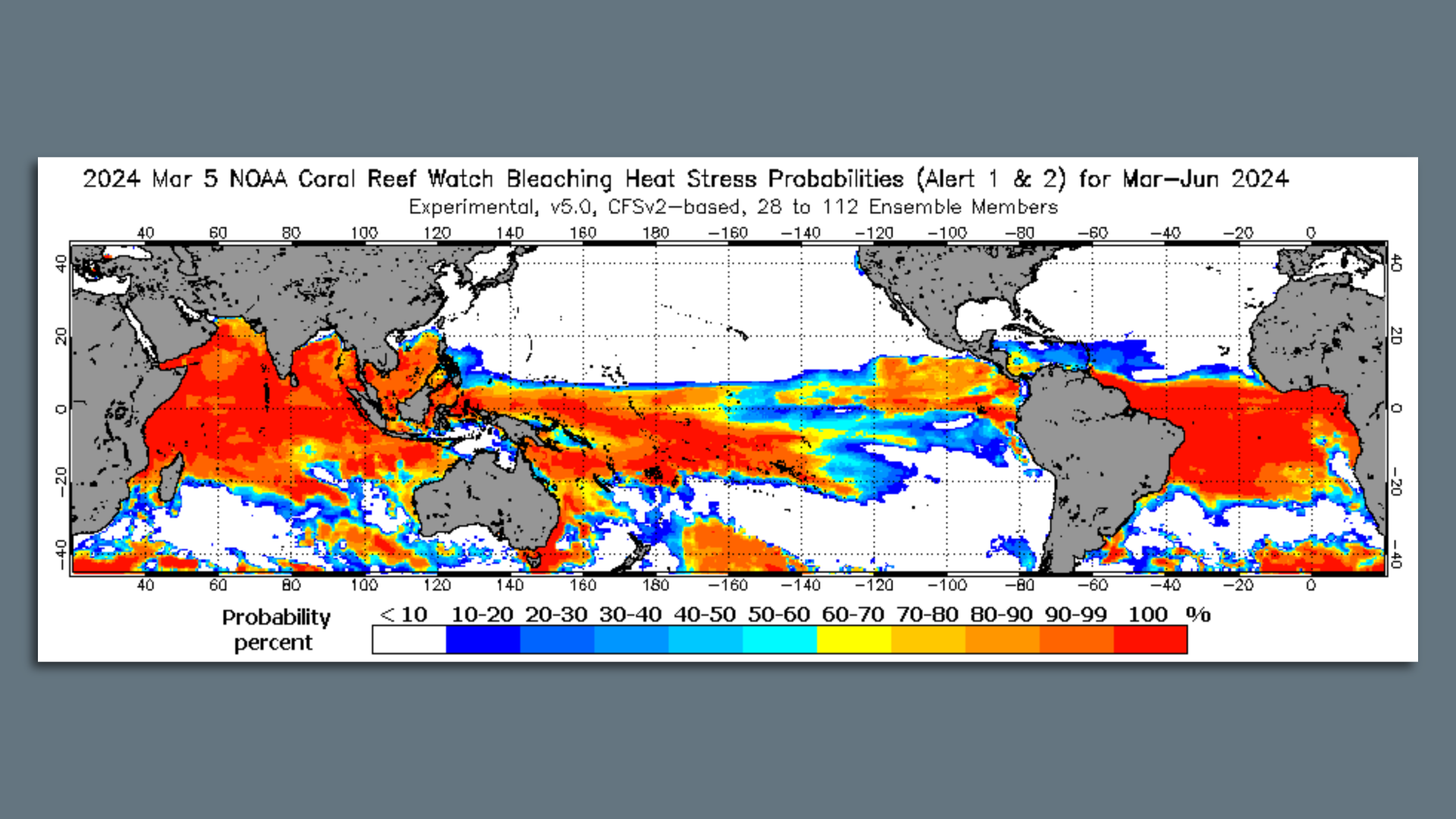Iconic coral reefs facing "widespread, large-scale coral bleaching event," NOAA warns

Coral bleaching is expected to continue on "multiple, major" reef regions due to ongoing marine heatwaves — with the world's largest coral reef ecosystem, Australia's Great Barrier Reef, among the areas hardest hit.
The big picture: That's according to a NOAA forecast that notes reef areas in the central equatorial and southwestern Pacific and western Indian Oceans are among the worst affected. Its four-month outlook for the Great Barrier Reef predicts a 90% chance of bleaching.

Why it matters: Coral reefs exist in more than 100 countries and territories and support at least 25% of marine species, providing food and economic security for hundreds of millions of people.
Threat level: "We are confident in saying that a widespread, large-scale coral bleaching event is happening," said ecologist Derek Manzello, who coordinates NOAA's Coral Reef Watch program, in an emailed statement Thursday.
- The CRW's four-month outlook suggests that nearly all coral reef environments in the Southern Hemisphere are likely to experience bleaching level heat stress this year, if they haven't already.
- "If this does come to fruition, then only the Austral Islands [in French Polynesia] are likely to be spared bleaching-level heat stress this year," Manzello said.
- "If current conditions persist and intensify, which is what the CRW four-month outlook suggests may happen, then we MAY be looking at a global bleaching event in the next few weeks to months."

Stunning stat: According to new findings from the Copernicus Climate Change Service, February had the hottest global average sea surface temperature of any month on record in the data, dating back to 1940.
Zoom in: In Australia, officials with the Great Barrier Reef Marine Park Authority confirmed Friday that a "widespread, often called mass, coral bleaching event is unfolding" across the iconic reef.
- The agency has been alerted to bleaching from all other reef regions and researchers are continuing to conduct in-water surveys across the ecosystem, which spans about 1,400 miles.
- This is the fifth bleaching event in the past eight years, and seventh since 1998.
Between the lines: Terry Hughes, a professor of marine biology at Australia's James Cook University, noted in a post to X on Thursday that accumulated heat stress along the Great Barrier Reef had increased markedly in the past two weeks.
- "If this continues for another week or two, it will exceed levels of heat exposure in any of the 6 earlier events," he said.
Case in point: Florida's coral reefs are "unfortunately being impacted by multiple stressors, with the recent bouts of record-setting heat stress being the latest impact, Manzello said.
- NOAA has implemented a reef restoration program in response that uses "state-of-the-art restoration techniques to ensure that key species of reef coral continue to contribute significantly" to Florida's ecology and economy, he added.
How it works: Warm water corals in particular are considered front line species facing global warming, given they have extremely narrow temperature ranges in which they can live and survive.
- When water is too warm, corals expel algae that live in their tissues, which causes them to turn a ghostly white in an event known as coral bleaching.
- Bleached corals are vulnerable to disease and mortality, per NOAA. This can lead to die-offs.
Zoom out: UN monitors have in recent years considered making the Great Barrier Reef the first World Heritage-listed site to be added to its "in danger list" due to the climate crisis following major mass bleaching events.
- It decided against doing so last year, but warned the iconic reef was still under "serious threat."
Our thought bubble: Some of the extremely hot ocean waters globally are due to a strong El Niño event in the equatorial tropical Pacific Ocean, but that event is already starting to wane.
- In fact, NOAA forecasts the likelihood that a La Niña event will form during the early Fall.
- These events feature cooler-than-average waters in the eastern Tropical Pacific, and if a new one takes shape, it could help reduce ocean heat stress for some, but by no means all, of the currently overheating reefs.
Go deeper: Australia's Great Barrier Reef has lost half its corals in 25 years
This story has been updated to reflect the declaration of a mass coral bleaching event on Australia's Great Barrier Reef.